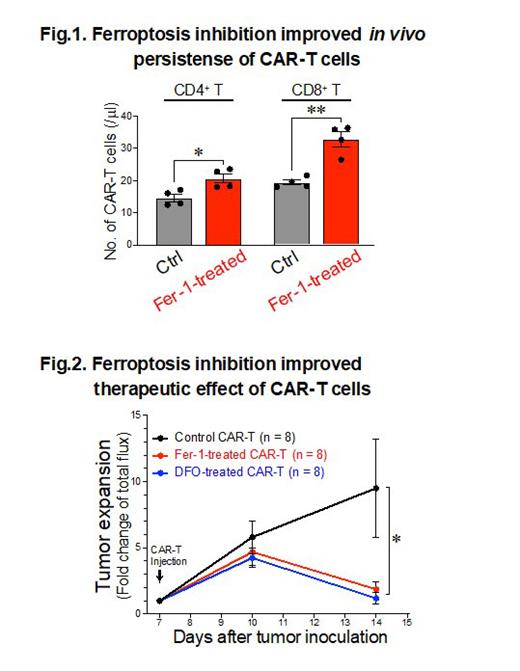[Introduction] Long-term in vivo persistence of chimeric antigen receptor (CAR) T-cells is associated with sustained response after CAR-T cell therapy against hematological malignancies. Ferroptosis is a novel form of programmed cell death that refers to iron-dependent regulated cell death resulting from lipid peroxidation and consequent cytomembrane rupture. The iron, lipid, amino acid, and glutathione metabolisms strictly govern the beginning and execution of ferroptosis. Recent studies demonstrated that ferroptosis limited longevity of virus-specific memory T cells (Wang Y: Nat Immunol 2022). However, the role of ferroptosis in CAR-T cells remains to be clarified. We herein explored the role of ferroptosis in CAR-T cells both in vitro and in vivo. [Methods] For CAR-T cell generation, purified T cells from naïve mice were stimulated with anti-CD3/CD28 antibodies for 48 hrs and then incubated with retroviral vector encoding anti-CD19 CAR (1D3-28Z.1-3; Addgene) for another 48 hrs, in the presence or absence of 32 µM of ferrostatin-1 (Fer-1), an inhibitor of the iron-dependent production of lipid hydroperoxide, or 10 µM of deferoxamine (DFO), an iron chelator. Flow cytometric analyses of phenotype of CAR-T cells, accumulation of reactive oxygen species (ROS), lipid peroxidation, and cytokine production were performed 96 hrs after T-cell stimulation. ROS were quantified using CellROX Green dye, and lipid peroxidation was evaluated using Lipid Peroxidation Assay Kit (abcam). [Results] First, we tested whether CAR-T manufacturing process could induce ferroptosis. We found a substantial accumulation of ROS in CAR-T cells compared to their pre-culture levels, along with a significant increase in lipid peroxidation, indicating that manufacturing process induces ferroptosis of CAR-T cells. Next, we tested whether ferroptosis inhibition by the lipid peroxidation inhibitor Fer-1, could impact the quality of CAR-T cells. When added to the culture, Fer-1 significantly reduced lipid peroxidation in CAR-T cells and significantly increased the proportion of CAR-T cells with a progenitor phenotype, TCF-1 +Tim-3 -, which is known to be associated with longevity of CAR-T cells. Importantly, ferroptosis inhibition significantly enhanced proliferative capacity and cytotoxicity against syngeneic A20 B-cell leukemia in vitro. Next, we tested whether ferroptosis inhibition by the iron chelator DFO could improve CAR-T cell functions. Similar to the effects of Fer-1, DFO mitigated lipid peroxidation of CAR-T cells in association with increased TCF-1 +Tim-3 - population, while it did not affect ROS accumulation. DFO-treated CAR-T cells demonstrated enhanced cytotoxicity against A20 cells compared with control CAR-T cells, confirming that ferroptosis inhibition improves anti-tumor effects of CAR-T cells. Finally, we examined whether ferroptosis inhibition could enhance antitumor effects of CAR-T cells in vivo. Naïve BALB/c mice were intravenously (i.v.) injected with 1.0 x 10 6 luciferase-expressing A20 cells on day 0, followed by i.v. injection of 1.0 x 10 5 Fer-1- or DFO-treated CAR-T cells or control CAR-T cells 7 days later. In mice injected with Fer-1-treated CAR-T cells, the numbers of CAR-T cells in peripheral blood on day 16 was significantly higher than those in mice injected with control CAR-T cells, suggesting that ferroptosis inhibition improved the persistence of CAR-T cells in vivo ( Fig. 1). In vivo bioluminescence imaging showed that both Fer-1-treated and DFO-treated CAR-T cells demonstrated significantly improved anti-tumor effects compared to control CAR-T cells ( Fig. 2). [Conclusions] We for the first time showed that ferroptosis limits the persistence and anti-tumor effects of CAR-T cells, while ferroptosis inhibition induces TCF-1 +Tim-3 - CAR-T cells and improves the therapeutic effect of CAR-T cell therapy.
Figure 1. The number of CAR-T cells in the peripheral blood on day 16 after tumor inoculation. Fer-1, ferrostatin-1; *, P < 0.05; P < 0.01.
Figure 2. The fold change of the total flux at each timepoint relative to the total flux of the baseline in the mice injected with DFO-treated CAR-T cells, Fer-1-treated CAR-T cells, and control CAR-T cells on day 7 after tumor inoculation. Fer-1, ferrostatin-1; DFO, deferoxamine; *, P < 0.05.
Disclosures
Hashimoto:Ono Pharma: Honoraria; Chugai Pharmaceutical: Honoraria; Janssen Pharma: Honoraria; Daiichi Sankyo Inc: Honoraria; LUCA Science: Patents & Royalties; Astellas Pharma: Honoraria; Kyowa-Kirin: Honoraria. Nakagawa:AbbVie Inc.: Research Funding; Astrazeneca: Honoraria; Meiji Seika pharma: Honoraria; Mundipharma: Honoraria; Takeda Pharmaceutical Company Limited: Honoraria, Research Funding. Teshima:Bristol-Myers Squibb: Honoraria; Takeda: Membership on an entity's Board of Directors or advisory committees; AstraZeneca: Membership on an entity's Board of Directors or advisory committees; DAIICHI SANKYO: Membership on an entity's Board of Directors or advisory committees; Meiji Seika Pharma: Membership on an entity's Board of Directors or advisory committees; Novartis: Honoraria, Membership on an entity's Board of Directors or advisory committees; Janssen: Honoraria, Membership on an entity's Board of Directors or advisory committees; Merck Sharp & Dohme: Honoraria; Celgene: Honoraria, Membership on an entity's Board of Directors or advisory committees; Kyowa Kirin: Honoraria, Research Funding; Chugai: Honoraria, Research Funding; Roche Diagnostics: Membership on an entity's Board of Directors or advisory committees; Sanofi: Membership on an entity's Board of Directors or advisory committees; Priothera SAS: Research Funding; LUCA Science: Research Funding; Otsuka: Research Funding; AbbVie: Honoraria; SHIONOGI: Research Funding; Sumitomo Pharma: Honoraria, Membership on an entity's Board of Directors or advisory committees, Research Funding; ONO: Research Funding; Astellas: Honoraria, Membership on an entity's Board of Directors or advisory committees, Research Funding; Asahi Kasei Pharma: Membership on an entity's Board of Directors or advisory committees, Research Funding; Eisai: Research Funding; Fuji Pharma: Research Funding; NIPPON SHINYAKU: Honoraria, Research Funding.


This feature is available to Subscribers Only
Sign In or Create an Account Close Modal